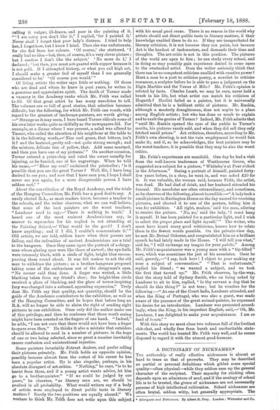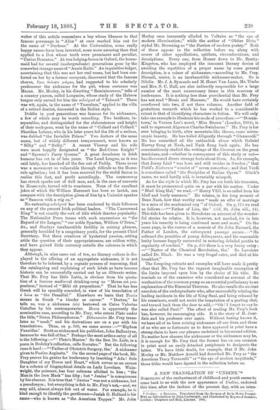A DICTIONARY OF NICKNAMES.*
THE authorship of really effective nicknames is almost as hard to trace as that of proverbs. They may be described as partial or personal definitions which gibbet some special quality—often physical—while they seldom sum up the general character of the recipient. Their capacity for sticking often depends upon an admixture of mud, and if the analogy of school life is to be trusted, the givers of nicknames are not necessarily persons of high intellectual cultivation. School nicknames are often brutal, seldom witty, but generally appropriate. The
• Sobriquets and Nicknames. By Albert R. Frey. London : Whittaker and Co.
writer of this article remembers a boy whose likeness to that famous personage in " Alice " at once marked him out for the name of " Duchess." At the Universities, some really happy names have been invented, none more amusing than that applied to a Don whose teeth were prominent and peculiar, " Curios Dentatus." At one lodging-house in Oxford, the house- maid had for several (undergraduate) generations gone by the somewhat strange name of "Annie Katie." An inquisitive lodger, ascertaining that this was not her real name, but had been con- ferred on her by a former occupant, discovered that the famous chorus, Elm); aykare Faxav, had suggested to his scholarly predecessor the nickname for the girl, whose surname was Macau. Mr. Mozley, in his diverting "Reminiscences," tells of a country parson, called Longmire, whose study of the Hebrew tongue only earned for him the sobriquet of " Talmud." There was wit, again, in the name of " Tuscillum," applied to the villa of a retired dentist, decorated in the Italian style.
Dublin in past generations was famous for its nicknames, a few of which may be worth recording. Two brothers, in- separables, and distinguished for the elaborateness and height of their neck-gear, went by the name of " Collard and Collard." Sheridan Lefann, who in his later years led the life of a recluse, was dubbed "the Invisible Prince." Two doctors of the same name, but of widely different temperament, were known as " Silky" and " Sulky." A recent Viceroy and his wife were most happily designated as " the Red-Cross Knight" and " Spenser's Faery Queens." A great decadence in Irish humour has set in of late years. The Land League, as it was said lately, has knocked all the fun out of Paddy. There never was a movement so vulnerable through ridicule as the Home- rule agitation ; but it has been reserved for the stolid Saxon to realise this fact, and profit accordingly. The controversy has struck sparks out of dull men, and, in the case of converts to Home-rule, turned wit to weariness. None of the excellent jokes of which Sir William Harcourt has been so lavish, can compare with the description given of him by a Unionist speaker as " Samson with a wig on."
No endearing sobriquet has been conferred by their followers on any of the present Irish political leaders. "The Uncrowned King" is not exactly the sort of title which denotes popularity. The Nationalist Press teems with such expressions as "the Bayard of the League," "our noble Spartan, William O'Brien," &a., and displays inexhaustible fertility in coining phrases, generally heralded by a sanguinary prefix, for the present Chief Secretary. But these creations of hysterical passion, setting aside the question of their appropriateness, are seldom witty, and have gained little currency outside the columns in which they appear.
Although, in nine cases out of ten, no literary culture is dis- played in the affixing of an appropriate nickname, it is not therefore to be inferred, by a cognate process of reasoning, that the cataloguing and explaining of such labels as have become historic can be successfully carried out by an illiterate writer. That Mr. Frey has little Latin, is obvious from his quota- tion of a famous medival drinking-song as " Menm est pro- positum," instead of "Mihi sit propositum." That he has less Greek will be speedily conceded, in view of his translation of affiyez as "the Dreadful." Elsewhere we learn that Tombs means in Greek " a bleeder or carver." " Doctus," he tells us, was a nickname (sic) bestowed on Caius Valerius Catalina by his contemporaries. Deum is apparently the nominative case, according to Mr. Frey, who enters Plato under the title, "Deum Philosophorum." Debonnaire Mr. Frey trans- lates as "meek," and hie derivations are on a par with his translations. Thus, on p. 300, we came across :—" Rigdum Funnidos.' Scott so nicknamed his publisher, John Ballantyne, because he was full of fun." Perhaps the most artless entry of all is the following :—" Plato's Master.' So the Rev. Dr. Lisle, in a poem in Dodsley's collection, calls Socrates." But the following runs it hard :—"'Father of Obstetric Surgery, the.' A nickname given to Paulus Aegineta." On the second page of the book, Mr. Frey proves his genius for irrelevancy by inserting " Ada! Sole Daughter of my House and Heart," which serves as an excuse for a column of biographical details on Lady Lovelace. Wain- wright, the poisoner, has four columns allotted to him ; "the Man in the Iron Mask " has fifty ; but " Junius " is conspicuous by his absence. It is true that " Junius " was not a nickname, but a pseudonym ; but everything is fish to Mr. Frey's net,—and, we may add, almost always fish out of water. For example, he is kind enough to identify the gentleman—Josiah G. Holland is his name—who is known as "the American Tupper." Mr. John
Morley once innocently alluded to Voltaire as "the eye of modern illumination;" while the author of " Obiter Dicta" styled Mr. Browning as " the Danton of modern poetry." Both of these appear in the collection before us, along with scores of other appellations, epithets, circumlocutions, and descriptions. Every one, from Homer down to Mr. Beatty- Kingston, who has employed the innocent literary device of avoiding the repetition of a proper name by some general description, is a coiner of nicknames,—according to Mr. Frey. Disraeli, senior, is an inexhaustible nickname-maker. So is Dibdin. Mr. J. A. Symonds and M. Henri Van Laun, Mr. Timbs and Mrs. S. C. Hall, are also indirectly responsible for a large number of the most unnecessary items in this museum of irrelevance. It is nothing less than providential that Mr. Frey has not read " Music and Manners." He would have certainly overflowed into two, if not three volumes. Another field of gratuitous research which he has worked to a considerable extent is that of identifying characters in fiction. We will only take one example to illustrate his mode of procedure :—"' Dennis- town,' in Vernon Lee's novel, Miss Brown' (London, 1884), is said to represent Algernon Charles Swinburne." Mr. Frey is for ever bringing to birth, after mountain-like throes, some micro- scopic inanity. He has toiled diligently through " Glenaveril." He has unearthed all the outlandish abuse which Gabriel Harvey flung at Nash, and Nash flung back again. He has conscientiously studied the writings of Mr. Crowest on the great musicians, and—whether in consequence of this study or not— has discovered divers strange facts about them. As, for example, that Jenny Lind " was born and still resides in Sweden ;" that Field's Nocturnes " consist of " seven concertos ; and that Verdi is sometimes called " the Euripides of Italian Opera." Gluck's name, we need hardly add, is invariably misspelt.
As for the style in which Mr. Frey has set forth his treasures, it must be pronounced quite on a par with his matter. Under " Bluff King Hal," we read,—" Henry VIII. is so called from his bluff and burly manners." He relates, in his long memoir of Beau Nash, how that worthy once " made an offer of marriage to a miss of the academical city " of Oxford. On p.114 we read as follows :—" Father of Lies, the' (aid. St. John viii., 44). This title has been given to Herodotus on account of the wonder- ful stories he relates. It is, however, not merited, for in late years his veracity is being confirmed more and more." On the same page, in the course of a memoir of Sir John Barnard, the Father of London, the subsequent passage occurs :—" He softened the penalties of young delinquents, and his seasonable lenity became happily successful in restoring deluded youths to regularity of conduct." On p. 250 there is a very funny entry : —" Nestor of the Chemical Revolution, the.' So Lavoisier called Dr. Black. He was a very frugal eater, and died at his breakfast."
The foregoing extracts and examples will have made it pretty clear that Mr. Frey has the vaguest imaginable conception of the limits imposed upon him by the choice of his title. He reminds us of the examinee who considered an account of the mechanism of the common pump as an essential preliminary to an explanation of the Binomial Theorem. He also recalls the ancient anecdote of the undergraduate who, after successfully relating the leading incidents in the life of King Saul, and being released by his examiners, could not resist the temptation of a parting shot, and turned back from the door to add,—" Oh ! I forgot to say he was also called Paul !" The effect of reading Mr. Frey's book has, however, its encouraging side. It is the story of M. Jour- dain and his professor over again. Without having known it, we have all of us been coining nicknames all our lives, and those of us who are so fortunate as to have appeared in print have a strong claim to have our phrases enshrined in his second edition. No matter how obscure the nicknamer or the nicknamee may be, it is enough for Mr. Frey that the former has on one occasion in print used an easily detached periphrasis to designate the latter. We have little doubt, for example, that if Mr. John
Morley or Mr. Matthew Arnold had described Mr. Frey as "the American Tracy Turnerelli" or "the eye of modern ineptitude," those titles would have figured in the collection before us.



































 Previous page
Previous page